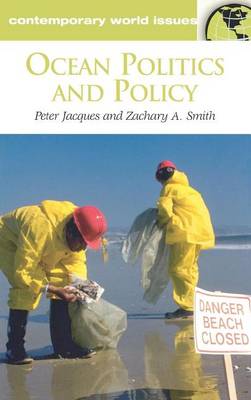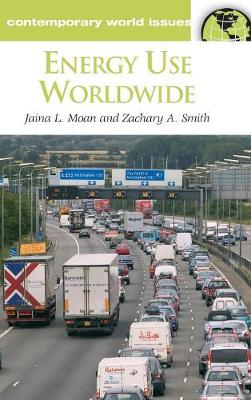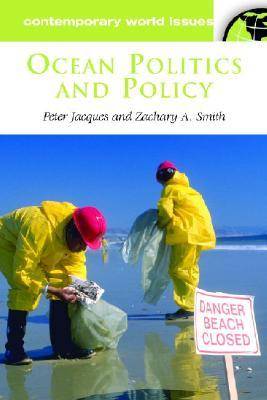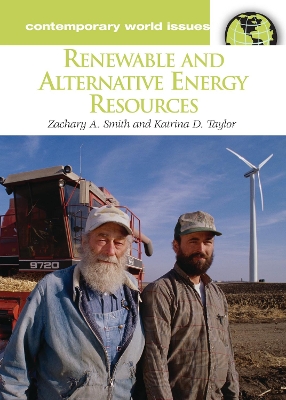Contemporary World Issues
5 total works
Ocean Politics and Policy: A Reference Handbook
by Peter Jacques and Zachary A. Smith
This book examines recent energy use trends and their potential consequences for the global population.
Global energy needs have increased dramatically over the past 100 years, and they will continue to increase, creating energy, environmental, and social crises. Can we solve this problem?
The first step, according to the authors of Energy Use Worldwide: A Reference Handbook, is to understand fundamental energy issues. Combining their knowledge from the complementary fields of science and policy, the authors begin by explaining the basic facts of energy-what it is, where it comes from, why it is important. Then they show how energy use is linked to global economics, identify key players, and examine the social and environmental consequences of our energy decisions. For readers interested in-or worried about-our use of fossil fuels, this book provides a keen understanding of both the problem and the possible solutions.
- More than 50 tables, graphs, and figures demonstrate the impact of energy use trends on global societies
- An energy chronology traces technological innovations, important social events (such as the 1973 oil embargo), and energy policies that have impacted current global energy use
This extensive yet concise introduction to the phenomenon of globalization looks at its economic, environmental, and security dimensions as interpreted from different political points of view.
Globalization: A Reference Handbook goes beyond the typical focus on multinational corporations and the wired world to explore the full scope of a process that actually began well before the dawn of the Digital Age.
This timely, highly informative resource describes the development of globalization, especially in the era from World War II to the present, covering not only its economic aspects, but crucial, interrelated environmental and security issues as well. Rather than limit itself to one interpretation, the book offers an unbiased review of the definitions and assessments of globalization from various points of view, serving readers as an authoritative introduction to what scholars and activists across the political spectrum think about the central phenomenon of our time.
- Includes original documents pertaining to globalization such as excerpts from free trade agreements, international environmental agreements, arms treaties, and the United Nations charter
- Provides a chronology of important events leading up to the modern era of globalization, showing a historical progression that contains precursor conditions and processes that reflect modern globalization
A sweeping overview of the problems, politics, and policies of international and domestic management of the world's oceans.
The world ocean is one of the most important global resources. Without it most life on earth would not survive because the ocean provides temperature regulation and produces oxygen, among other vital functions. However, this life-sustaining resource faces dangerous threats from over fishing, industrial wastes, oil pollution, and loss of biodiversity.
Ocean Politics and Policy covers the major types of pollution, deep sea-bed mining, international jurisdictional disputes, and piracy, examining the underlying reasons for these problems and providing practical policy suggestions for reducing their impact. Special focus is placed on historical and contemporary ocean laws, from the concept of "freedom of the seas" to the 2001 Fishery Stock Agreement. Solving the problems facing the world ocean should be a high priority for the international community, and this book provides a starting place for this process.
- Provides a chronology of the development of ocean management
- Reproduces portions of documents along with important raw data on world fish catch trends and whale populations
Renewable and Alternative Energy Resources
by Zachary A. Smith and Katrina D. Taylor
This volume provides an insightful overview of renewable and alternative energy technologies and policies in the United States and around the world.
Are renewable and alternative energy solutions needed to combat many of the negative effects of fossil fuel (including global warming)? Can such solutions be "clean," and still economically viable? For readers wanting clear, objective answers to questions like these, this fascinating, highly informative volume is the ideal source.
Renewable and Alternative Energy Resources: A Reference Handbook provides an authoritative, unbiased overview of existing and potential renewable and alternative energy technologies, covering the benefits and drawbacks associated with each. It then looks at a number of specific questions and controversies on this issue, examining the social, political, and economic aspects of renewable and alternative energy use in the United States and other countries-detailing different approaches and activities of international organizations, national governments, and private sector initiatives.
- A chronology of technological developments, events, and policies related to renewable and alternative energy
- A glossary of renewable and alternative energy related concepts including Ocean Thermal Energy Conversion (OTEC), net metering, and stages of technology development




